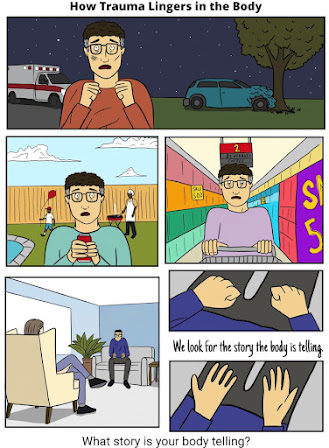“Wait… So You’re Saying It’s All in My Head?” – A Not-So-Traumatic Guide to Psychosomatic Symptoms (Part 2 of the Medical Trauma Series)
Okay, so picture this: You’ve been dealing with weird, relentless symptoms—pain, numbness, fatigue, dizziness, digestive chaos, or a migraine that could take down a small army. You finally muster up the courage (and emotional energy) to see a doctor, and after a full workup, they lean in with that tone and say,
“Well, we’re not seeing anything wrong. It might be… psychosomatic.”
Cue the rage. Cue the spiral. Cue you hearing, “You’re making it up,” even if that’s not what they said out loud.
Let’s unpack that, shall we?
“Psychosomatic” Isn’t a Dirty Word (Even If It Feels Like One)
Let’s be honest: “psychosomatic” sounds like a gaslight in a lab coat. It’s been used for decades as a kind of medical shrug—especially toward women, BIPOC folks, and anyone who doesn’t fit the stereotypical diagnostic picture. For many of us, that word triggers a deep sense of not being believed. Like… how can it be in my head when I feel it in my BODY?
But here’s the twist:
Psychosomatic symptoms are very real.
They’re just… complicated.
The term literally means “mind-body,” and refers to physical symptoms that are either caused by, worsened by, or sustained by psychological factors—like stress, trauma, or unprocessed emotions. But that does not mean you’re faking, exaggerating, or imagining things. It means your nervous system is trying to tell a story your mouth hasn’t been able to say yet.
What Do Psychosomatic Symptoms Actually Look Like?
Psychosomatic doesn’t mean “just anxiety.” It means your nervous system is on overdrive, and your body is sounding the alarm in whatever language it knows best.Some common psychosomatic symptoms:Chronic pain without a clear injury
Numbness or tingling (especially in hands/feet)
Digestive issues (hello, IBS and GERD)
Fatigue or heaviness that feels paralyzing
Chest tightness or shortness of breath
Seizure-like episodes without epileptic activity (more on this below!)
Difficulty walking, talking, or moving in ways that feel… off
Sound familiar?
You’re not alone. And you’re definitely not broken.
Let’s Talk About FND – Functional Neurological Disorder
Formerly known as conversion disorder (we’re still un-cringing from that term), FND is a condition where you experience real neurological symptoms—seizures, paralysis, tremors, speech difficulties, vision issues—without structural damage in the brain.
So yes, something is happening in the brain-body system. It’s just not visible on a CT scan or MRI. But the impact? Very real. Very disruptive. And very misunderstood.
FND sits right at the intersection of neurology and psychiatry, which means it often falls into the cracks of both. It can be incredibly invalidating when you’re passed from specialist to specialist with no answers and lots of side-eye.
But FND is finally getting more research, recognition, and trauma-informed treatment.
So... What Helps?
Here’s the good news: psychosomatic symptoms and FND can improve. Your nervous system isn’t stuck forever—it just needs a little support and rewiring.
Treatment ideas that actually help:
Psychotherapy (especially somatic-based therapies)
Think EMDR, somatic experiencing, brainspotting, and trauma-informed CBT. These help your brain process the stress or trauma that’s living rent-free in your nervous system.Occupational and physical therapy (FND-informed)
These professionals can help retrain your movement patterns, reduce symptom severity, and empower your body to feel safer.Psychoeducation
Understanding the mind-body connection can reduce fear, and fear itself can actually intensify symptoms. So yes—knowing what’s happening can help it calm down.Mindfulness and grounding
Guided imagery, breathwork, gentle movement, and nervous system regulation can soften the internal alarm system.Medical providers who believe you
This one’s big. You deserve a care team that treats you like a human, not a mystery. Ask for referrals to trauma-informed or FND-specialized clinicians.Support groups or therapy groups
Because it helps so much to hear: “Oh my god, me too.”
Also? Stress Can 1000% Exacerbate Medical Conditions
Let’s normalize this: just because stress worsens your symptoms doesn’t mean it’s only stress. GERD, migraines, chronic pain, autoimmune flares—they all respond to emotional overwhelm like toddlers in a sugar crash. That doesn’t make your condition imaginary. It makes you human.
Your body isn’t betraying you—it’s begging you to listen.
You Deserve More Than Dismissal
Let’s rewrite the narrative around psychosomatic symptoms. You’re not “too sensitive.” You’re not “making it worse.” You’re living in a body that’s absorbing years of stress, trauma, and invalidation—and it’s finally waving a white flag.
So if you’ve been told your symptoms are “just” in your head, here’s the truth:
Your body’s not lying.
Your symptoms are real.
And healing is possible—even if it takes some detective work, self-compassion, and a care team who gets it.









Comments
Post a Comment